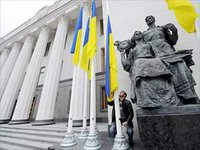The West throws financial loop on Ukraine
A U.S. investment fund Franklin Templeton bought government bonds of Ukraine for the nominal sum of $5 billion. This is a risky transaction, because the return on these bonds is not guaranteed. What is the justification of this risk? It is a political decision as Ukraine signed an agreement with the EU and got in debt bondage of the West.

Five billion dollars is nearly 20 percent of the Ukrainian foreign debt, wrote the Financial Times. The Wall Street Journal pointed out that, as of June 30, Franklin Templeton allocated about $2.4 billion to the Ukrainian debt. The amount of this transaction is not disclosed.
Given the low sovereign rating of Ukraine (according to Standard & Poor's, it's "B" with a "Negative" forecast), Ukrainian securities cannot be purchased by pension funds. In this situation, traditionally the main investors are only western European hedge funds, considering Ukrainian bonds as an opportunity to diversify the portfolio with high-risk but more profitable assets.
This does not apply to Franklin Templeton. This company was behind the purchase of Ireland's debt obligations. These bonds were purchased on the eve of the crisis in the Eurozone, and after the provision of aid to Dublin from the EU and IMF, the Americans received large profit.
However, Ukraine is not an EU member. Now the country is living in expectation of deterioration of the financial situation in the near future. We are talking about a large budget deficit and a negative balance on the current accounts, which has already led to the rapid depletion of foreign exchange reserves of the country. "The financial situation in Ukraine is not stable, and new fluctuations are expected. This is inevitable for a country that has not shared its geopolitical status with anyone, and economically is very weak," Alexander Buzgalin, an economist and doctor of Economics, Professor of Moscow State University., told Pravda.Ru.
Therefore, this Ukrainian transaction is very risky for the Fund. Ukraine should "share its status" and take loans for these debts, but with whom and from whom? A leading analyst of Morgan Stanley Paolo Batory told the Financial Times that Ukraine was simply not ready to deal with the next wave of capital flight and would need help of a third party, be it Russia or the IMF. According to him, the worst case scenario for Kiev when the authorities would have to seek emergency international assistance can come at any moment, next week or next month.
"Russia does not have a long-term policy towards Ukraine, one that would lead to the integration of our countries," told Pravda.Ru Alexander Buzgalin. "Basically, this policy is dictated by the interests of big business in Russia aggressively fighting with big and equally aggressive Ukrainian business. Such a policy, or rather, lack thereof, cannot lead to positive results. Therefore, a one-time event, the purchase of debts, is not interesting for Russia. The United States has a consistent interest in supporting Ukraine as a large resource base, an underbelly of the West, primarily through Poland, on the other side of the geopolitical game where the West has always positioned itself against Russia," said Alexander Buzgalin.
Ukraine will not take a loan from the Russian Federation but will take it from the IMF and the European Central Bank, and will act according to the Irish scenario. Apparently, this scheme of action was negotiated in good faith when purchasing the Ukrainian debts by the Americans. Obviously, this is only possible after the signing of the Association Agreement with the EU, and most analysts do not doubt that it will happen on November 26 at the "Eastern Partnership" summit in Vilnius. Predictions-threats are already heard. Timothy Ash of Bank Standard said that if Ukraine fails to sign the agreement with the EU it would face a real risk of a full-scale economic and financial crisis.
"I do not rule out that now there will be a few political decisions by the Americans and Europeans in order to financially support Ukraine, because it is clear that the signing of the agreement with the EU will be very costly to the country," Konstantin Simonov, head of the Applied Political Science department with the Financial University under the Government of the Russian Federation commented on the situation for Pravda.Ru. According to the expert, the purchase of the Ukrainian debt is this type of a measure because "Russia will certainly economically punish Ukraine and Ukraine will wait for help to remove the initial tension.
Then "the West will gladly help Ukraine to get on the debt needle and then make it let their business there. This is their usual tactic," he said. When asked why Russia does not purchase these debts and help Ukraine, Simonov said that Ukraine already owed Russia.
"For example, "Naftogaz" in August alone accumulated $800 million dollars of debt, and a lot in other months. What about penalty fees that Russia can make them pay under the contract? Only for gas alone this year they amounted to $10 billion, and we will go to arbitration," said Simonov. Russia proposed other methods of cooperation, for example, the entry into the Customs Union, but Ukraine has chosen its own path.
"Ukraine kept blackmailing Russia, saying that it would leave for Europe, blackmailing Europe saying that it would leave for Russia, and now finds itself pinned to a wall. Ukraine will sign a fatal agreement, but it's its choice. We should not go to Kiev with a bag of money and beg Ukraine not to sign this agreement. We will not be able to stop the act of economic suicide. Loans will ease the disease, but the fatal outcome is guaranteed anyway," concluded the expert.
Lyuba Lulko
Pravda.Ru
Subscribe to Pravda.Ru Telegram channel, Facebook, RSS!




